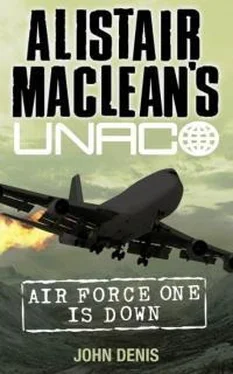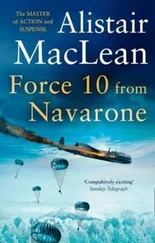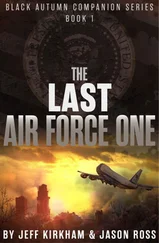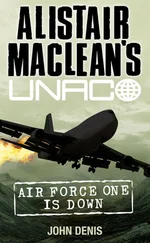‘I must stay with him,’ Sabrina appealed to Smith. ‘He’s ill. You surely can’t want anything to happen to him. He isn’t even on the ransom list.’
Zeidan reinforced her plea by pointing out that if Feisal suffered another attack, Sabrina alone could administer his medication. To Achmed’s evident annoyance, Smith agreed, and Sabrina and Feisal were led up another flight of steps to a room which looked as if it had been hastily adapted for accommodation, containing as it did nothing but two beds, a table and a wash-basin, with an adjoining toilet. Its most conspicuous feature, however, was the long slit running the full length of the external wall, protected from the worst effects of the weather by an overhanging eave, jutting out like a peaked cap.
The vent was panelled in glass now, but Sabrina guessed that it had once been a lookout position, a sentry-room, affording as it must a panorama of the entire area, assuming they were up as high as the definite chill in the room suggested. There was no lighting in their cell, so they undressed, and Sabrina had just snuggled down into her bed when they heard the sound of a motor-cycle starting up in the courtyard below.
Pulling the bedspread off to wrap around her nakedness, Sabrina hurried to the slit window, and was joined by Feisal. A loud ‘clunk’ came from somewhere to their left, and Feisal whispered, ‘Must be a drawbridge.’
‘Good thinking,’ Sabrina said, shivering as the cold nipped at her body.
The motor-cyclist roared away, and from their perch they were able to follow his lights for what seemed miles down the twisting road.
‘That was a Honda,’ Sabrina said smugly.
She knew motor-bikes almost as well as she knew cars, and was adept at driving both.
Feisal nodded in agreement.
‘Hondamatic 400,’ he confirmed.
Sabrina stared at him.
‘How could you tell that?’ she asked.
This time Feisal snickered.
‘He went for at least two hundred yards without changing gear. On a Hondamatic 400 you don’t have to change up until you hit 55 mph.’
Sabrina’s eyes widened.
‘I didn’t know that,’ she ventured.
‘I am not at all surprised,’ Feisal remarked. ‘There would be no reason for a woman to possess such knowledge.’
Sabrina tried to hide her grin.
‘Listen, you smart-aleck, know-all kid–’ she began, but Feisal cut her off.
‘That’s what everyone says,’ he assured her airily. ‘And incidentally, your somewhat inadequate garment has slipped. May I be permitted to congratulate you on your magnificent breasts?’
He jumped back into bed and was fast asleep almost as soon as his head touched the pillow.
McCafferty’s executive jet streamed through the night sky and deposited him at Zagreb well before the sun was high in the east. He passed easily enough through customs with his back-pack, which had been covered by UNACO’s diplomatic immunity on a hastily forged laissez-passer that Mac had found, on Swann’s instructions, among the aircraft’s store of useful documents. The Yugoslav guards examined the form and cast suspicious eyes at the pack, but waved him on.
He used his newly acquired credit cards to hire a car, a small but powerful Polski Fiat with a formidable top speed on the speedometer. He didn’t have long to wait. Dunkels’ flight arrived on time and Mac, huddled down in the rear seat of his car, saw the German enact the same performance at the Avis desk. Just as Dunkels was completing the formalities, however, he was hailed from the roadside.
He turned, and both he and McCafferty saw a black Mercedes – with Swiss plates – moored at the kerb, Dr Stein’s talkative chauffeur grinning at Dunkels’ evident surprise. The German jumped into the front seat and the Mercedes pulled away – with the Fiat following at a discreet distance. McCafferty gritted his teeth as he stamped on the car’s accelerator. He had a score to settle with Dunkels. And with Smith. He sensed that their chase marked the start of the last lap.
Dunkels headed south from Zagreb on the M12a, which was signposted for Busevec, Lekenik and Zazina. The road was fairly deserted, and Mac had to keep the little Fiat well back to escape detection. After about nineteen miles, Dunkels’ car swung to the right for Gora, and then turned left into a small private airfield. It was hardly more than a large stretch of grass, permitting a clear run of barely fifteen hundred feet in any direction. Standing near the group of rusty, corrugated iron sheds which passed for hangars was a Russian-built Kamov helicopter.
The helicopter’s contra-rotating blades were already revolving for take-off, and the Mercedes drove straight up to it. Moments later McCafferty caught sight of Dunkels running crouched beneath the rotors to get on board. The door had not even closed when the engine revolutions started to rise, and a low, loud pulsating roar of sound heralded the Kamov’s departure.
Mac cursed under his breath. He should have foreseen something of the kind, or waited for backup. Now he was powerless to keep on the German’s tail. He parked the Fiat on a grass verge behind a rubbish-filled metal skip as the Mercedes shot out of the airfield and skidded into a turn. Mac pulled up the hood of his anorak to hide his face but the chauffeur passed him without even a first look.
Then the Kamov’s engine noise rose to a howl, and the helicopter passed over his head, its down-draught tearing the leaves from the trees and flattening the grass.
The American moodily started his own engine and drove up the narrow road just past the field, intending to reverse into its entrance for the trip back to Zagreb. He was looking over his shoulder to get the proper sighting when his eye fell on a small gaggle of light aircraft parked near the sheds.
He whistled and said, ‘Hey. Suddenly it’s Christmas.’
Mac reversed all the way into the airfield and put the Fiat in the space between two of the sheds; then he got out to examine his unexpected presents. There was a twin-engined Cessna, an old Piper Tripacer, an Italian Marchetti, and what appeared to be several versions of the Yugoslav UTVA. He checked that no one else was about, and inspected the three leading Yugoslavian planes. He had never flown one, but he kept up to date with the technical journals, and knew that the UTVA had a low stalling speed, good short-field performance and, unusually, a surprising turn of speed.
McCafferty rubbed his chin and slipped a stick of chewing-gum into his mouth.
‘I’d say, at a rough guess, forty … forty-five miles an hour faster than the Kamov,’ he mused. Another thought struck him: the UTVA could probably fly at least seven thousand feet higher than the helicopter. A grin split his face and he said, out loud, ‘Now then. Let’s see if someone has been careless enough to leave the keys in one of these babies.’
He chose the aircraft parked alongside the end of the first hangar, and immediately struck gold: the keys were there. He strolled casually back to the Fiat, still keeping his eyes peeled for signs of life. Mac took his haversack out of the car and locked the door. Then he scuttled back to the UTVA and threw himself into the cockpit, keeping his body below the window line while he carried out the pre-take-off checks.
Mac tested the master-switch, and the indicator showed he had a full tank of fuel. He checked that the electrical system was functioning, and then moved the stick and rudder pedals to ensure that there were no control locks on. Whispering a ‘good luck’ message to himself, he operated the start-control.
This was the most crucial stage of the operation, because the engine noise would be a dead giveaway – though with any luck it would be too late by then to stop him. The engine fired at once, and his luck held: he looked out of the window, careless now whether anyone saw him or not.
Читать дальше
Конец ознакомительного отрывка
Купить книгу










